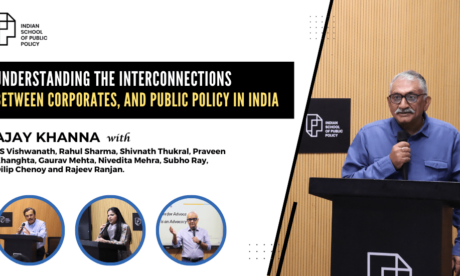Understanding the interconnections between Corporates, and public policy in India

As part of the PDM curriculum, Indian School of Public Policy (ISPP) held a mini course on Public Policy and Corporates. The course which comprised of two sessions, spanned across April 27 and April 28. With the objective to support scholars to understand the intricate relationships of business, with government and society, the course was led by Mr Ajay Khanna, an industry expert who is Global Advisor to the Catalyst 2030 & a Co-Founder of Public Affairs Forum of India (PAFI). who is also a Professor of Practice at ISPP. In addition to this, Mr Khanna is presently the Group Strategic Advisor & Global Ombudsperson of Jubilant Bhartia Group, advises BYJU’S Group & is a Senior Advisor with The Convergence Foundation, SaveLife Foundation & Pahle India foundation.
To provide a first-hand perspective, we hosted multiple guest speakers during the two 3-hour long sessions.
In our first session, we were joined by TS Vishwanath, Rahul Sharma and Shivnath Thukral.
TS Vishwanath is Director General, Past President, and Founding Member of the Public Affairs Forum of India (PAFI), Principal Adviser with ASL- Legal and Co-Founder of VeKommunicate, a Public Affairs & Communications Firm. He has over 35 years of experience in analyzing global economic and policy issues and political developments. On the other hand, Rahul Sharma, the Managing Director of APCO Worldwide, India, brought nearly 30 years of experience in media and public affairs to the table. Finally, Shivnath Thukral who serves as the Public Policy Head at META, India, added immense expertise to the glowing session.
For our next session, we had powerful line-up of enterpreneurs and policy experts which included Praveen Khanghta, Gaurav Mehta, Nivedita Mehra, Subho Ray, Dilip Chenoy and Rajeev Ranjan.
Praveen Khanghta heads Strategy, investment and portfolio building at The Convergence Foundation (TCF), an organization which aims to improve lives of all Indians by enabling rapid and sustained economic growth. Following him, we had a short lecture by Gaurav Mehta, the Founder and CEO of Dharma Life, a social enterprise working to improve the quality of life in rural India through a women entrepreneurship model that provides low-income households and individuals at the last mile with livelihoods, awareness and access to socially impactful products and services.
The session was then taken over by Nivedita Mehra who leads US-India Strategic Partnership Forum (USISPF) in India, a non-profit bilateral independent organization that works with US companies investing in India and Indian companies in the US. Subho Ray, the President, Internet and Mobile Association of India (IAMAI) and Managing Committee Member of PAFI, continued the session further.
The last leg of the session was led by Dilip Chenoy and Rajeev Ranjan. Dilip Chenoy, who is the Chairperson of the Bharat Web3 Association, shared his insights gained from his 40 years of experience in various esteemed positions like Secretary General of the Federation of Indian Chambers of Commerce & Industry (FICCI), Managing Director and Chief Executive Officer of the National Skill Development Corporation (NSDC), Director General of the Society of Indian Automobile Manufacturers (SIAM), and Deputy Director General of the Confederation of Indian Industry (CII). On the other hand, Dr. Rajeev Ranjan, IAS (retd.), the Director at IPL Centre for Rural Outreach (ICRO) & Senior Adviser at National Cooperative Development Corporation (NCDC), who previously served as the Secretary in the GoI shared his expertise in public policy.
The speakers emphasized the importance of thorough mapping and consultation when interacting with multiple stakeholders in a project, which is often a tedious task as accommodating differing points of view of stakeholders can be a difficult task.
The sessions provided invaluable insights into how corporations collaborate with important stakeholders in the policy sphere and what is expected from policy professionals in light of the close scrutiny of corporate conduct. Corporates do not operate only in the economy but also influence the society. However, they often wade in uncertainty as new policies are launched with minimal notice. As India is projected to become a $40 trillion couple of decades from now, corporations would have a crucial role to play.
The guest speakers shared their experiences and knowledge to help the students understand the intricacies of the relationship between corporates, government, and society.


